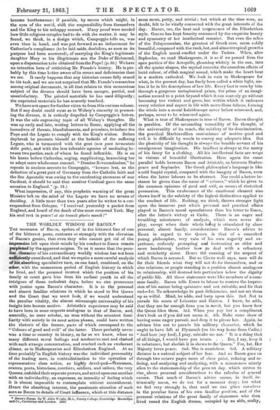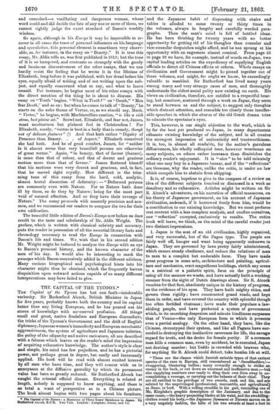THE WORLDLY WISDOM OF BACON.*
•
THE meanness of Bacon, spoken of in the bitterest line of one of the bitterest poets, contrasts so strangely with the elevation of Bacon's genius, that even they who cannot get rid of the impression left upon their minds by his conduct to Essex remain perplexed by the apparent enigma. To us it seems that the pecu- liar character of his extraordinary worldly wisdom has not been sufficiently considered, and that we require a more careful analysis of his absorbing speculative turn, on one hand, combined, on the ether, with the momentous period of English history in which he lived, and the personal interest which the position of his family at court gave him from his earliest youth in all the intrigues of those turbulent days, before we can pronounce with justice upon Bacon's character. It is to the personal and almost familiar relations in which he stood to the Queen and the Court that we must look, if we would understand the peculiar vitality, the almost microscopic universality of his insight into human motive. Aristotle's experience may be said to have been in some respects analogous to that of Bacon, and, assuredly, no mere scholar, no man without the minutest fami- liarity with society in its most active phases, could have written the rhetoric of the former, parts of which correspond to the " Colours of good and evil" of the latter. There probably never was a time or country in history, sq far as we know, when so many different moral feelings and tendencies met and clashed with such strange concentration, and reached such an exuberant climax, as in Shakespearian and Elizabethan Englaud. At no time probably in English history was the individual personality of the leading men, in contradistinction to the operation of representative class action, so highly developed—Satateismen, orators, poets, historians, courtiers, soldiers, and sailors, the very Queens, unfolded their separate powers, and acted upon one another with an individuality, an eagerness, an intensity of feeling which it is almost impossible to contemplate without astonishment. Hence the absorbing interest, the passionate attention of such men as Bacon to details of Court influence, which at this distance seem mean, petty, and trivial ; but which at the time were, no doubt, felt to be vitally connected with the great interests of the day. Hence, too, the heat and turgescence of the Elizabeth:1U style. Greece has kept futurity entranced by the exquisite beauty and symmetry of her intellectual remains. But even the relies of the Peloponnesian, the greatest of Greek erns, seem coldly beautiful, compared with the rank, hot, and almosttropicsl growths of the English moral conflict under the Tudors. When, after Sophocles, we read Shakespeare, it is as if we passed from the open portico of the Acropolis, gleaming whitely- in the sun, into all the quaint shapes, the myriad conceits, the countless effects of lurid colour, of elfish magical sound, which make the heart beat in a modern cathedral. We look in vain to Shakespeare for what, in the present day, has finely been called a white light, un- less it be in his descriptions of low life. Every fact is seen by him through a gorgeous metaphorical prism, the prism of an imagi- nation nursed to a point beyond which it can scarcely go without becoming too violent and gross, but within which it embraces every relation and aspect in life with marvellous fulness, forming the whole into a moral kaleidoscope never before witnessed, and, perhaps, never to be witnessed again.
What is true of Shakespeare is true of' Bacon. Bacon thought in parables. Of the astounding versatility of his thought, of the universality of its reach, the subtlety of its discrimination, the practical Machiavellian omniscience of motive good and evil, it is difficult by words to convey any adequate idea. But the plasticity of his thought is always the humble servant of his omnipresent imagination. His intellect is always at the mercy of his fancy for a clothing. All his intellectual facts are wrapt in visions of beautiful illustration. Here again the same parallel holds between Bacon and Aristotle, as between Shakes- peare and Sophocles. The Greek philosopher's language is like a cold limpid crystal, compared with the imagery of Bacon, even when the latter labours to he abstract. Nor could a better in- stance be given than the name of " colours," which lie gives to the common opinions of good and evil, as means of rhetorical persuasion. This exuberance of the emotional element also shows itself in the subtlety of the logical distinctions applied to the conduct of life. Nothing, we think, throws stronger light upon the immense part which personal and practical affairs played in Bacon's moral speculations than his letter to Essex, after the latter's victory at Cadiz. There is an eager and trembling minuteness of analysis, which fnen never dis- play, except when their whole being is stimulated by close personal, almost family, considerations. Bacon's advice to Essex in regard to the Queen. is that of a conceited young philosopher, very vain of bis own sagacity and ex- perience, zealously prompting aad instructing an older and more headstrong brother how 4o deal with a refractory and crotchetty sister. Hence tilt cunning of the serpent of which Bacon is accused. But as Cicero well says, men will do for their friends what they will not do for themselves, and so also relations, or people standing in a position almost analogous to relationship, will descend into particulars below the dignity of public life. All those statesmen were like members of a com- mon family. Bacon tells Essex to labour to rem+ove the impres- sion of his nature being opiaiastre and not ruleable, and for that end-1st. To acknowledge to past deficiencies, and not set them up as wilful. Mind, be adds, and harp upon this. 2nd. Not to parade his scorn of Leicester and Hatton. I know, he adds, that they are far enough from you in Merit, but you know how the Queen likes them. 3rd. When you pay her a compliment don't look as if you did not mean it. 4th. Make some show of having some eager pursuit, and drop it to please her. Again, he advises him not to parade his military character, which he ought to have left at Plymouth (on his way home from Cadiz.) "And here (my lord), I pray, mistake me not. * It is a thing that of all things, I would have you retain. . . But, I say, keep it in substance, but abolish it in shows to the Queen." For, 1st. Her Majesty loves peace. 2nd. She is avaricious. 3rd. A military dictator is a natural subject of her fear. And so Bacon goes on through two octavo pages more of close print, refining and re7 fining, and analyzing and analyzing, with a minuteness utterly
alien to the statesmanship of the pres3ut day, which strives to rise.above personal considerations to the calculus of general causes. That much of Bacon's advice seems, in itself, in- trinsically mean, we do not for a moment deny ; but what we feel very strongly is, that until we eau place ourselves in the peculiar focus of his own familiar position, and of the
Bacon's Essays. By Allis Wright, M.A., Trinity College, Cambridge. Macmillitn personal relations of the great family of statesmen who then
and. conceited—a vacillating and dangerous woman, whose word could and did decide the fate of any one or more of them, we cannot rightly judge the exact standard of Bacon's worldly wisdom.
So again, although in his Essays it may be impossible to re- cover in all cases the trace of personal influences on his language and speculation, this personal element is sometimes very observ- able, as, for instance, in the essay on "Beauty." It is true this essay, Mr. Aldis tells us, was first published in 1612; but the tone of it is so hampered, and contrasts so strangely with the gaudy and luminous discursiveness of the other essays, that we can hardly resist the feeling that he wrote it in the lifetime of Elizabeth, long before it was published, with her dread before his eyes, equally afraid of writing and of not writing upon the sub- ject, and equally concerned what to say, and what to leave unsaid. For instance, he begins most of his other essays with the direct mention of the thing he is about to discuss. His essay on "Truth" begins, "What is Truth?" on "Death," "Men fear Death," and so on ; butwhen he comes to talk of " Beauty," he starts on the safer theme of Vertue, or, as we should say, Merit. " Vertue," lie begins, with Machiavellian caution, "is like a rich stone, best plains set." Scowl not, Elizabeth, and fear not, James, most meritorious but plainest fool in Christendom I For Elizabeth, surely, "vertue is best in a body that is comely, though not of delicate features'' (!) And that hath rather "Dignity of Presence than Beauty. . . of Aspect." Elizabeth conceived sbe had both. And be of good comfort, James, for " neither is it almost scene that very beautiful! persons are otherwise of great vertue." Again, " in beauty, that of favour (feature), is more than that of colour, and that of decent and gracious motion more than that of favour." James flattered himself that his motions were very decent and gracious, and,. in fact, that he moved right royally. How different is the trim- ming tone of this essay from the hard, cold, analytic, almost brutal dissection of deformity:—" Deformed persons are commonly even with Nature. For as Nature bath done ill by them, so do they by Nature; being for the most part void of natural affection. And so they have their revenge of Nature." The essay proceeds with masterly precision and acu- men, and we recommend our readers to compare the two for their own edification.
The beautiful little edition of Bacon's Essays now before us does credit to the taste and scholarship of Mr. Aldis Wright. The preface, which is written with classical sobriety and accuracy, puts the reader in possession of all the essential literary facts and chronology necessary to read the Essays in connection with Bacon's life and times. We wish that in his second edition Mr. Wright might be induced to analyze the Essays with an eye to Bacon's personal history, and the known character of the men of his day. It would also be interesting to mark the passages which Bacon successively added in the different editions. Many curious biographical and psychological hints into his character might thus be obtained, which the frequently barren disquisition upon outward actions capable of so many different interpretations may have failed to give.































 Previous page
Previous page